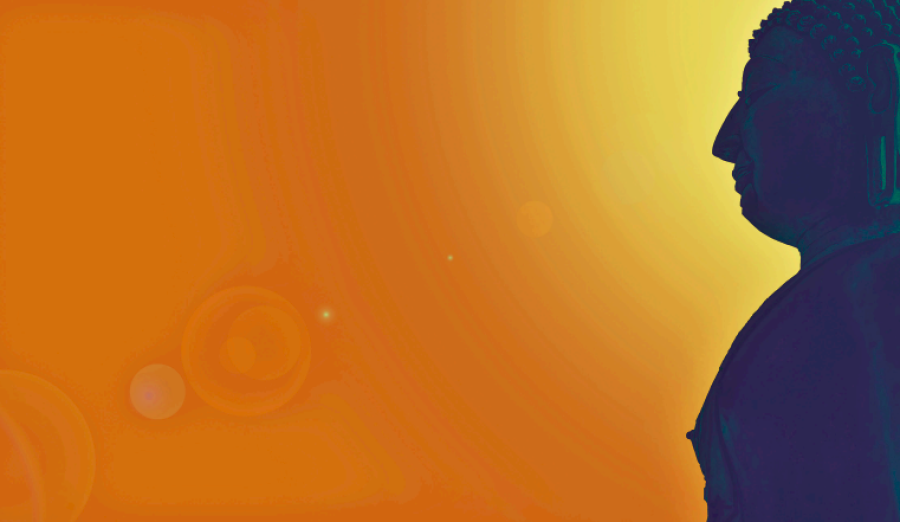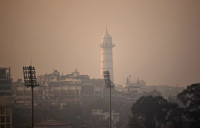Opinion
Writing plays on Buddhist themes
Buddhism is a grand positive, poetic and secular mantra that creates a passage for the quest for peace and sanity.
Abhi Subedi
The organiser of Buddha Theatre Festival March 2021, Pushkar Gurung, artistic director of Dabali Theatre, tossed me a minuscule storm, as it were, when he asked me to write a paper on my 'Buddha plays' for the seminar of the festival. In that cyclone of memories, I felt I was trying to find a ground to stand. I have written four plays with Buddha theme in different years of the twenty-first century starting from 2003 when I wrote Agniko Katha translated as ‘Fire in the Monastery’ which, according to its director Sunil Pokharel, is my magnum opus. They opened Gurukul Theatre with this play the same year. Sunil and Arohan Gurukul showed this play in India and several cities of Europe including Moscow. I will just mention why I wrote the Buddha plays and how they did catch up with the times.
One reason why I chose to write plays with a Buddha theme was that the period when I wrote them was very turbulent in Nepal. The Maoist insurgency had completely reversed the familiar course of history. The democratically elected government had never realised that the normal course of a parliamentary system of government would be challenged by a very strong kind of alterity in politics, culture, system of perception and management. An order of violence became the new norm. For the writers, theatre people, academics and artists, in particular, this period did not show any foreseeable order. We were embroiled in a new kind of reality that was a mixture of hope, uncertainty and creativity, to be sure. We chose various ways for that; chose various genres for writing. I chose to write plays with Buddha as the main theme. Agniko Katha was the major oeuvre in which I tried to create a consonance of poetry, philosophy, political vision, violence and a sense of amelioration. In other words, I chose a medium in which I could write about everything. But writing a play is different from writing any other genre. It is written for performance. Not being a theologian or a Buddhist scholar, my forte was to create a kind of poetic admixture of various elements.
I, therefore, mixed turbulence with calm for which I drew strength from the essential teachings of the Buddha for a meaningful life. My use of the Buddhist theme was not shaped by any hard-core epistemology about Buddhism. But I felt the first major challenge when a youthful monk named Gyan decides to go out in search of greater meaning in spiritual quest after fire burns most of the library of the monastery. I was not quite sure where he would go, but settled that he would go to Kailash, Mansarovar. A nun from the nearby monastery also shows her desire for the exit, but that was not possible. She sadly bids him farewell. I did not know how to face that storm of life when a monk and nun feel there is something very powerful shaking them. This play was successfully performed.
After many weeks of performance Gyurme Sultrim, Khenpo of Sechen Monastery, Boudha came to see the play accompanied by a group of monks and scholars. I was a little nervous about that. As my play was brimming with life and softer feelings about the relationship between the young monk and nun, though that was only a brief expression of feelings, I felt the Khenpo would be upset. To prepare him beforehand I said, ‘Khenpo, this play has come out very well’. He said, ‘undoubtedly, because it is written by a scholar.’ I said, ‘No, Khenpo, it has come out well not because of my scholarship but because of my ignorance’. Because of my ignorance about the great Buddhist scholarship and formulas, I had taken recourse to poetry, and a sense of ecstasy to compensate for that.
I sat behind him and his flock throughout the show at Gurukul theatre waiting for him to show perhaps his displeasure. Towards the end of the play, the main Lama gives gyaan speech to the monks and nuns gathered at the moment of Drubchen—a meditative retreat. I put Zen-like poetry into his mouth because that was my strength and my understanding of Buddhism as a consonance of poetry, knowledge and vision. The Khenpo turned back and saw me waiting for his response. His face was all smiles and he looked very calm. He said, ‘yes, that is what Buddhism is all about!’ If that moment were to be captured and accentuated as the English poet John Keats says, I would have become a full-time Buddhist seeker.
Out of the three other plays with a Buddhist theme, I would like to mention my experience about writing another major play entitled Mayadevika Sapanaa or the 'Dreams of Mayadevi’, now translated into English by Shiva Rijal and Carol Davies, Nepali and American academics respectively. It is about the Maoist insurgency, the very encounter with violence and war. But again I have chosen to work with the grand power of life, with the poetic confidence and energy of peace. Mayadevi, an elderly woman who has lost her husband, an Indian soldier, in some war, has one son who has become a Maoist guerrilla. A friend of his comes for shelter at Mayadevi's small house one evening of the battle. He takes the elderly mother to see the battlefield directly that night. The elderly woman in a dream that night becomes Mayadevi who gives birth to the future Buddha on her way to Kapilvastu. When she wakes up, she finds that her son and comrades have come to take with them the boy taking shelter in her house. Mayadevi says to her fleeing son, ‘my darling, you are leaving without meeting me, which hurts. But I have seen a good dream for you. You will have good days ahead!’ After the show of the play directed by Nisha Sharma, a few Maoist boys took me down the hill of Gurukul in the dark. I followed them with some misgivings. Instead, the boys expressed gratitude to me for saying good things about them.
As this article is a short edition of my long paper about my ecstasy and experience of writing plays with a Buddha theme, I want to put my conclusion in these words. Writing plays with a Buddhist theme for a person like me is like opening new frontiers of understanding Buddhism by evoking the power of poetry, life and theology. Buddhism to me, and to many others, is a grand positive, poetic and secular mantra that creates a passage for the quest for peace, love and sanity in the mad times.




 7.12°C Kathmandu
7.12°C Kathmandu











